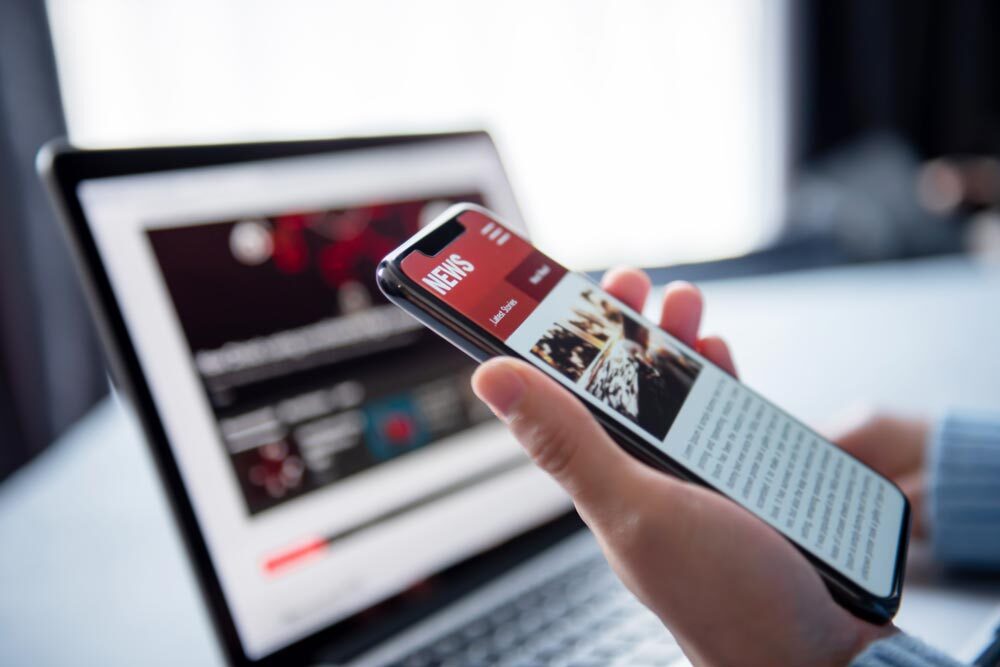Why Journalists Are Turning to stnews.live for Breaking Stories
The Relevance of Fact-Checking in the World of News Online
The frequency of false information in today's online news landscape has actually gotten to worrying degrees. Fact-checking organizations play a crucial duty in combating this trend. They verify claims and enhance the trustworthiness of journalism. The performance of these companies commonly pivots on their techniques and public perception. As target markets navigate this complicated environment, the implications of their searchings for may form the future of news usage and count on. What does this mean for the stability of details relocating forward?

The Increase of False Information in the Digital Age
How has the arrival of digital innovation added to the spread of misinformation? The quick development of the web and social media systems has helped with the circulation of details at an extraordinary speed. Users can share articles, videos, and opinions with a plain click, typically without confirming the material's precision. Formulas prioritize mind-blowing or emotionally billed product, bring about a proliferation of deceptive narratives that record attention.
Additionally, the anonymity managed by digital systems permits individuals to spread out incorrect information without responsibility (stnews.live). False information flourishes in resemble chambers, where customers are exposed mostly to viewpoints that reinforce their ideas, better setting fallacies. The saturation of info can overwhelm customers, making it testing to discern reputable sources from undependable ones. Misinformation has actually come to be a pervasive issue in the electronic landscape, impacting public point of view and count on in legitimate news resources.
The Role of Fact-Checking Organizations
Fact-checking organizations play an important role in improving the credibility of journalism by verifying cases made in report. Their efforts are important in combating false information, guaranteeing that accurate details prevails in the electronic landscape. By holding media electrical outlets liable, these organizations add considerably to informed public discourse.
Enhancing Reputation in Journalism
While misinformation proliferates in the electronic age, fact-checking companies play an important role in boosting the credibility of journalism. These companies carefully validate cases made in news write-ups, public declarations, and social networks messages, guaranteeing that info disseminated to the public is exact and credible. By supplying independent analyses, they work as a vital resource for journalists, assisting them preserve high criteria of stability. Additionally, their initiatives advertise openness in media, cultivating public trust. As target markets become progressively critical, the presence of respectable fact-checking entities can distinguish dependable news resources from those that might spread out fallacies. Ultimately, the dedication of fact-checking companies to copyright truthfulness is critical for the health and wellness of democratic discussion.
Combating False Information Efficiently
As misinformation continues to spread out swiftly across electronic platforms, the role of fact-checking organizations ends up being progressively critical in the battle for accurate info. These companies function as guard dogs, inspecting claims made by public numbers and media electrical outlets to ensure liability. By utilizing extensive research approaches and expert analysis, they verify truths and clear up misleading stories. Their findings are disseminated through different channels, educating the public and cultivating vital thinking. In enhancement, partnerships with social media sites systems improve their reach, enabling timely flagging of incorrect information. As electronic literacy grows, the impact of fact-checking companies is essential in empowering audiences to discern truth from fraud, ultimately contributing to a more informed culture.
Exactly How Misinformation Affects Public Perception
Misinformation greatly threatens trust fund in media, leading audiences to doubt the integrity of news sources. Therefore, individuals usually are attracted in the direction of electrical outlets that enhance their existing beliefs, adding to the polarization of viewpoints. This dynamic develops a fragmented info landscape, where shared understanding ends up being significantly tough to accomplish.
Count on Media

Count on media has become progressively fragile in the electronic age, where the quick spread of incorrect details can alter public assumption. As false information proliferates across social media and on-line platforms, audiences often find it challenging to recognize reputable sources from undependable ones. This unpredictability promotes apprehension, leading many people to examine the intentions behind news reporting. Count on in established media outlets has actually reduced, as customers progressively transform to different sources that might do not have extensive editorial standards. This erosion of trust not only influences individual ideas however also undermines the collective capability to engage in notified discussions. Ultimately, the integrity of journalism goes to stake, highlighting the crucial demand for efficient fact-checking to restore confidence in the media landscape.

Polarization of Viewpoints
The increasing suspicion towards typical media has added to an expanding polarization of point of views amongst the general public. False information, typically shared via social media and online systems, plays a substantial role in forming distinctive ideological divides. People regularly seek out details that straightens with their pre-existing beliefs, enhancing their point of views while disregarding opposing perspectives. This resemble chamber effect heightens divisions, resulting in a fragmented public discourse where agreement ends up being significantly elusive. Additionally, sensationalized stories prosper in this setting, better skewing public understanding and promoting suspect in legitimate resources. As polarization escalates, the requirement for reliable fact-checking ends up being vital to connect gaps and promote educated conversations, eventually guaranteeing a much more cohesive culture capable of maneuvering intricate problems.
Strategies for Effective Fact-Checking
Effective fact-checking counts on a systematic technique that includes thorough research study, verification of resources, and critical analysis of cases. A foundational strategy is cross-referencing information from numerous credible sources to validate its accuracy. Fact-checkers commonly utilize specialized data sources and archives to map the origin of specific statements, making certain that the reported details aligns with recorded proof.
Another vital approach involves looking at the context in which claims are provided. Deceptive information can develop from out-of-context quotations or discerning information usage. By examining the wider narrative, fact-checkers can recognize potential predispositions or false impressions.
Additionally, engaging with specialists in pertinent areas can supply clearness and insight that improves the fact-checking process. This collaboration can uncover nuances that laypeople may neglect - stnews.live. Eventually, a regimented technique incorporating these strategies cultivates an extra enlightened public, improving the reliability of info disseminated in the digital age
The Impact of Social Media on News Intake
How has social media sites transformed the way people eat news? The introduction of platforms like Facebook, Twitter, and Instagram has significantly transformed news consumption patterns. News is now shared swiftly, permitting users to gain access to real-time updates and engage with web content through likes, shares, and comments. This immediacy has actually cultivated a preference for bite-sized information, typically at the expense of in-depth evaluation.
In addition, social media allows individualized news feeds, where formulas curate web content based upon user preferences, creating echo chambers that may limit exposure to diverse perspectives. The role of typical news electrical outlets has lessened as individuals significantly depend on peer referrals and trending subjects. The credibility of info is often compromised, as sensationalism can overshadow valid reporting. Generally, social media sites has actually reshaped news intake, emphasizing rate and personalization while testing hop over to these guys the standards of journalistic stability.
Encouraging Audiences to Identify Dependable Resources

Furthermore, analyzing the authorship and organizational background of newspaper article can reveal prospective predispositions. Cross-referencing information throughout several reliable electrical outlets better improves the verification process. Utilizing electronic devices, such as browser extensions that rate the integrity of internet sites, can likewise assist in identifying trustworthy info. By actively involving with these resources and growing a critical mindset, target markets can better furnish themselves to determine reliable news sources, eventually promoting a more informed culture amidst the intricacies of today's media atmosphere.
The Future of Journalism and Fact-Checking
As the media landscape evolves, the future of journalism and fact-checking deals with both challenges and chances. The rise of digital systems has equalized information circulation, permitting diverse voices to arise. However, this has additionally led to the spreading of misinformation, requiring durable fact-checking systems. Reporters will significantly count on innovation, consisting of AI tools, to confirm realities quickly and efficiently.
Partnership in between wire service and fact-checking entities is expected to reinforce reliability and openness. Target market interaction will play a necessary function, as informed readers come to be significant partners in determining credible material.
The need for liability and accuracy is most likely to expand, pressing journalists to promote high criteria in their coverage. Ultimately, the future of journalism may hinge on its capability to adapt to technological improvements while preserving journalistic honesty, guaranteeing that fact-checking remains a cornerstone of trustworthy news.
Often Asked Questions
Just How Can I Report False Information I Run Into Online?
To report false information experienced online, people can make use of platform-specific coverage tools, provide clear proof, and share the details with fact-checking companies. Involving with community discussions can likewise aid raise recognition about the misinformation.
What Prevail Indicators of Misinformation in News Articles?
Typical indicators of misinformation in news short articles consist of marvelous headlines, absence of trustworthy sources, psychological language, irregular facts, and lack of author qualifications. Readers ought to seriously assess web content for these signs to recognize precision.
Exactly How Do Fact-Checkers Validate Sources?
Fact-checkers validate sources by cross-referencing details with legitimate databases, consulting professionals, and taking a look at the initial context of claims. They likewise analyze the dependability of the resources, ensuring accurate and reliable information for public usage.
What Legal Activities Can Be Taken Against Misinformation?
Lawsuits against false information may consist of disparagement suits, cease-and-desist orders, and regulative charges. Targets can seek remedy through this article civil courts, while some jurisdictions impose fines or assents on platforms disseminating false details.
Are There Apps for Fact-Checking News On-The-Go?
Numerous applications exist for fact-checking news on-the-go, including Snopes, FactCheck.org, and PolitiFact. These applications aid users verify insurance claims promptly, advertising educated decision-making and fostering an extra discerning approach to consuming news in real-time.